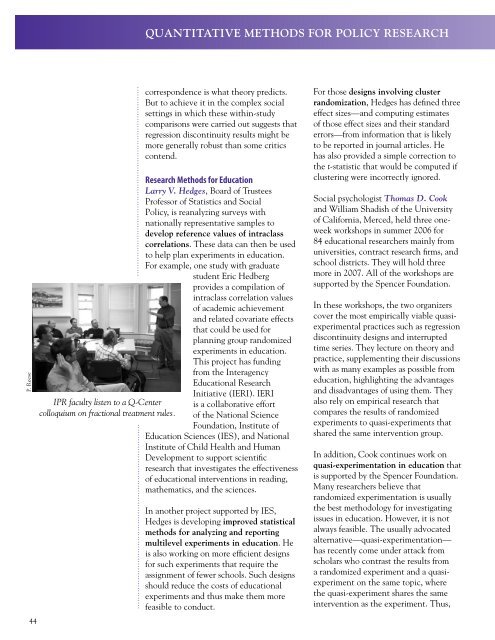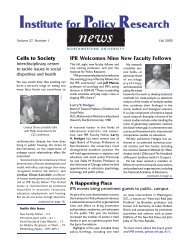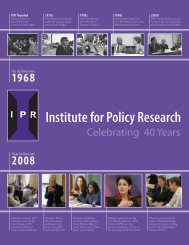pdf - Institute for Policy Research - Northwestern University
pdf - Institute for Policy Research - Northwestern University
pdf - Institute for Policy Research - Northwestern University
Create successful ePaper yourself
Turn your PDF publications into a flip-book with our unique Google optimized e-Paper software.
P. Reese<br />
Quantitative Methods <strong>for</strong> <strong>Policy</strong> <strong>Research</strong><br />
44<br />
IPR faculty listen to a Q-Center<br />
colloquium on fractional treatment rules.<br />
correspondence is what theory predicts.<br />
But to achieve it in the complex social<br />
settings in which these within-study<br />
comparisons were carried out suggests that<br />
regression discontinuity results might be<br />
more generally robust than some critics<br />
contend.<br />
<strong>Research</strong> Methods <strong>for</strong> Education<br />
Larry V. Hedges, Board of Trustees<br />
Professor of Statistics and Social<br />
<strong>Policy</strong>, is reanalyzing surveys with<br />
nationally representative samples to<br />
develop reference values of intraclass<br />
correlations. These data can then be used<br />
to help plan experiments in education.<br />
For example, one study with graduate<br />
student Eric Hedberg<br />
provides a compilation of<br />
intraclass correlation values<br />
of academic achievement<br />
and related covariate effects<br />
that could be used <strong>for</strong><br />
planning group randomized<br />
experiments in education.<br />
This project has funding<br />
from the Interagency<br />
Educational <strong>Research</strong><br />
Initiative (IERI). IERI<br />
is a collaborative ef<strong>for</strong>t<br />
of the National Science<br />
Foundation, <strong>Institute</strong> of<br />
Education Sciences (IES), and National<br />
<strong>Institute</strong> of Child Health and Human<br />
Development to support scientific<br />
research that investigates the effectiveness<br />
of educational interventions in reading,<br />
mathematics, and the sciences.<br />
In another project supported by IES,<br />
Hedges is developing improved statistical<br />
methods <strong>for</strong> analyzing and reporting<br />
multilevel experiments in education. He<br />
is also working on more efficient designs<br />
<strong>for</strong> such experiments that require the<br />
assignment of fewer schools. Such designs<br />
should reduce the costs of educational<br />
experiments and thus make them more<br />
feasible to conduct.<br />
For those designs involving cluster<br />
randomization, Hedges has defined three<br />
effect sizes—and computing estimates<br />
of those effect sizes and their standard<br />
errors—from in<strong>for</strong>mation that is likely<br />
to be reported in journal articles. He<br />
has also provided a simple correction to<br />
the t-statistic that would be computed if<br />
clustering were incorrectly ignored.<br />
Social psychologist Thomas D. Cook<br />
and William Shadish of the <strong>University</strong><br />
of Cali<strong>for</strong>nia, Merced, held three oneweek<br />
workshops in summer 2006 <strong>for</strong><br />
84 educational researchers mainly from<br />
universities, contract research firms, and<br />
school districts. They will hold three<br />
more in 2007. All of the workshops are<br />
supported by the Spencer Foundation.<br />
In these workshops, the two organizers<br />
cover the most empirically viable quasiexperimental<br />
practices such as regression<br />
discontinuity designs and interrupted<br />
time series. They lecture on theory and<br />
practice, supplementing their discussions<br />
with as many examples as possible from<br />
education, highlighting the advantages<br />
and disadvantages of using them. They<br />
also rely on empirical research that<br />
compares the results of randomized<br />
experiments to quasi-experiments that<br />
shared the same intervention group.<br />
In addition, Cook continues work on<br />
quasi-experimentation in education that<br />
is supported by the Spencer Foundation.<br />
Many researchers believe that<br />
randomized experimentation is usually<br />
the best methodology <strong>for</strong> investigating<br />
issues in education. However, it is not<br />
always feasible. The usually advocated<br />
alternative—quasi-experimentation—<br />
has recently come under attack from<br />
scholars who contrast the results from<br />
a randomized experiment and a quasiexperiment<br />
on the same topic, where<br />
the quasi-experiment shares the same<br />
intervention as the experiment. Thus,
















